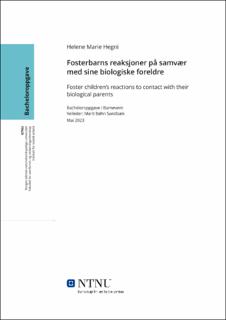Fosterbarns reaksjoner på samvær med sine biologiske foreldre
Bachelor thesis
Permanent lenke
https://hdl.handle.net/11250/3074974Utgivelsesdato
2023Metadata
Vis full innførselSamlinger
- Institutt for sosialt arbeid [1381]
Sammendrag
Bacheloroppgaven tar for seg et viktig og aktuelt tema innenfor barnevern, samvær mellom fosterbarn og biologiske foreldre. Samværspraksis har vært gjenstand for mye kritikk de siste årene, og norsk barnevern ble dømt i 11 saker av EMD i 2020 grunnet samværsordninger. Forskning viser at barns reaksjoner er en hovedfaktor i de tilfeller samvær blir redusert. Med tanke på dommene fra EMD og kritikken mot det norske barnevernet er det viktig at reaksjonene ikke blir misforstått. Oppgaven drøfter hvordan fosterbarns reaksjoner i forbindelse med samvær kan forstås. Metoden som er brukt er litteraturstudie. Det innebærer at relevant litteratur har blitt undersøkt og analysert. Problemstillingen har blitt drøftet i lys av forskning, juridiske rammer, tilknytningsteori og nevrobiologisk forståelse. Oppgavens drøftelse peker på at barns reaksjoner på samvær både kan bunne i for hyppig og for få samvær. Andre faktorer, som foreldreveiledning, kan også ha en effekt på kvaliteten av samværene mellom barnet og foreldrene. The bachelor thesis deals with an important and relevant topic within the child welfare system; contact between foster children and biological parents. This has been subject to much criticism in recent years, and the Norwegian child welfare system was convicted in 11 cases by EMD in 2020 due to this. Research shows that children’s reactions are a key factor in cases where contact is reduced. Given the convictions from EMD and the criticism of the Norwegian child welfare system, the reactions mustn’t be misunderstood. The thesis discusses how foster children’s reactions to contact with their parents can be understood. The method used is literature study, meaning that relevant literature has been examined and analyzed. The issue has been discussed in light of research, legal frameworks, attachment theory, and neurobiological understanding. The thesis’s discussion points to that foster children’s reactions to contact with their parents, can both indicate too much contact and too little contact. Other factors, like parental guidance, will also affect the quality of the contact between the child and the parents.
